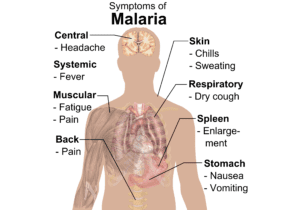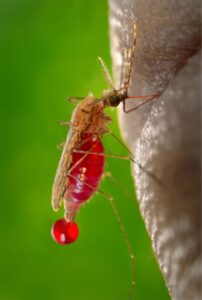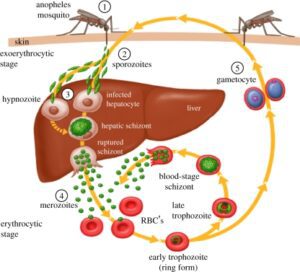Malaria is a disease which can be a life-threatening disease. it can have serious repercussions on the body if it is not diagnosed at the correct time and properly. Malaria occurs due to mosquitoes, its symptoms depend on which type of Malaria parasite you are infected with.
There could be some cases where no symptoms were found of Malaria but one can suffer from the disease. and this case with those who have low immunity. basic symptoms of malaria are seizures, headaches, fever, etc.
Malaria is possibly higher in tropical countries due to the hot and humid in such places.

Malaria:-
Malaria happens and transfers from one person to another via the bites of infected female Anopheles mosquitoes. they act as a vector. mainly this disease is not transferred directly from one person to another but it can also be transferred through contaminated needles or any blood transfusions.
A person who is already suffering from Malaria and then the same mosquito bites another person. malaria parasites transfer to their body and infect their red blood cells. thus the person develops malaria symptoms.
common symptoms of Malaria:-
It takes seven to eight days to develop mild symptoms but there are some cases where parasites may live in human bodies for years without showing any symptoms.
Below are some symptoms that are mainly observed
- Headache and muscle pain
- Nausea, fatigue
- Chest pain, cough, breath problem
- High temperature
- Vomiting, diarrhea
The most common symptoms of malaria are eight to ten hours of shivering high fever, weakness, and headache. there could be some flu-type symptoms after getting infected by malaria parasites. so it is advised to go for a medical check-up in such cases.

plasmodium causes Malaria:-
Malaria is caused by many species of plasmodium parasites. below are the most common species that cause malaria in humans
- Plasmodium falciparum:- severe malaria cases are caused by this species. this is the most dangerous and life-threatening form of malaria.
- Plasmodium vivax:- This species spreads globally and causes a number of malaria. it is mainly found in Asia, Latin America, and Africa. Plasmodium vivax can form dormant liver stages, leading to relapses of the disease.
- Plasmodium malariae: a milder form of malaria caused by this species and it is found in many regions of the world. it has a longer duration of infection as compared to other plasmodium species.
- Plasmodium Ovale:- this species is similar to Plasmodium vivax and this also forms dormant liver stages and causes relapses. this species is mainly found in West Africa and it is less common than other species.

Types of Malaria Parasites:-
The plasmodium parasite is carried by the infected mosquitoes. it is categorized into four types which are Plasmodium malariae, Plasmodium Vivax, Plasmodium falciparum, and Plasmodium ovale. The malaria parasite gets injected into the bloodstream when the mosquitoes which are infected bite a person.
This disease causes many other health concerns apart from fever for example trouble breathing, organ failure, seizures, etc. The development cycle of the malaria parasite depends on how long the lifespan of that infected mosquito is.

mosquitoes transmit Malaria:-
One question should be in your mind how does a mosquito get afflicted by such a parasite?
so the answer is as we discussed before that malaria is transmitted by anopheles mosquitoes and the cause of this disease depends on many factors such as human host, climate, vector, and types of parasite.
The climate has the most important role because mosquito breeds are found in places with specific temperature ranges. malaria occurs during monsoons and in places where high humidity levels are found and also where people have low or no immunity. but still have a question how exactly does the transmission occur?
Generally, mosquitoes get infected after biting someone who has been suffering from this disease already. At this time the insect ingests a small amount of infected blood containing malaria parasites. so at the time, it bites another person then the parasite mixes with its saliva and transfers to another body.
in its initial stage, these parasites travel to the liver after that they travel to the bloodstream to infect red blood cells. apart from these, there are many other ways where a healthy person can affected by malaria. for example blood transfusion, organ transplant, etc. there could be the chances of congenital malaria where this disease can transmit from an infected mother to her baby at the time of birth delivery.
Malaria diagnosed:-
This disease should be examined as soon as possible for a speedy recovery. so if you are living in any malaria-endemic areas and find any symptoms then it’s advised to go to any microscopic laboratory to test for confirmation of malaria.
it is very difficult to find malaria disease in anyone because in the beginning there are only some flu-like symptoms. so parasitological tests should be necessary to identify the illness and start the malaria treatment right away.
The treatment procedure for Malaria:-
If you are suffering from this condition then you should take the prescribed medications for the elimination of the plasmodium parasite from the bloodstream. the total duration of its treatment totally depends on which type of parasite you have in your blood cells.
The best option is to get its treatment under expert supervision so that you can get easy access to any necessary medicine and advanced equipment to treat this condition.
if is there any case of uncomplicated malaria then ACT (artemisinin-based combination therapy) is recommended. this therapy is useful to decrease the proportion of plasmodium parasites in the bloodstream.
Risk factors of Malaria:-
The first risk factors of malaria depend on where you live where you visit or if this disease is common in those areas.
For example, all the tropical and subtropical regions such as south and southeast Asia, the Pacific islands, sub-Saharan Africa, etc are mostly prone to these diseases.
Different types of malaria are caused by different kinds of parasites. the complications arise mainly because of delayed diagnosis.
if is there any case of severe plasmodium falciparum infection then the anemia symptoms found by the doctors as the parasites destroy the red blood cells after a point.
Red blood cells with parasites can end up blocking the circulation of major organs and can result in severe problems such as liver failure, jaundice, pulmonary edema, etc.

Other complications:-
Another complication may be acidosis. in this, the pH of the patient’s blood ends up and becomes acidic because the red blood cells keep releasing toxic compounds. due to low levels of oxygen and high levels of carbon dioxide in the lungs, the patient can suffer from breathlessness.
Control and prevent Malaria:-
As there is no vaccine available it’s better to keep yourself safe from any contamination by malaria parasites. always try to avoid any malaria-endemic countries but if it’s important to go then follow some necessary measures.
Below are some measures so that you can protect yourself from the complications of malaria
Mosquito repellent:-
Mosquito repellent is registered with the Environmental Protection Agency since it contains para-menthane-3, 8-diol, DEET, IR 3535, and other effective elements.
Mosquito nets:-
It is the simplest way to avoid any contraction from mosquitoes and this disease. with this help, you can keep yourself from other harmful chemicals.
Skin cover:-
you should wear long-sleeved shirts or any dresses and trousers to avoid any skin exposure from mosquito bites. also, you can spray mosquito repellent on your clothes for extra protection
Get the shot:-
If you are visiting any endemic area then make sure to use antimalarial prophylaxis beforehand.
No standing water:-
Mostly mosquitoes grow where water accumulates in containers, tires, or small pits. you should make sure these storage boxes do not have any standing water. especially during monsoons. try to keep those places clean.
Home remedies:-
- Turmeric:- Turmeric has antioxidant and antimicrobial properties. it is very powerful when tackling the malaria parasite. so you should drink a glass of turmeric milk every night to reduce its chances.
- Cinnamon:- It has anti-inflammatory properties which help in dealing with the symptoms or pain which are associated with this disease. you can take this with some black pepper powder in hot water and consume it once or twice a day
- Citrus fruit:- Citrus fruit has vitamin C and these are beneficial to stop the infection from spreading and increase the healing process of your body. so you can consume it directly or extract juice from it.
Apart from the above given you can consume some other ingredients such as cider vinegar, basil, herbal tea, ginger, etc. You can take these along with your medicines to reduce their pain.

FAQ:-
Q1:- How malaria is caused?
Ans:- Malaria is caused by the Plasmodium parasite
Q2:- What is the prevention of malaria?
Ans:- taking prescription medicine and preventing mosquito bites
Q3:- What is the best drink for malaria?
Ans:- drink glucose water, fresh fruit juices, and coconut water
Q4:-How malaria spread?
Ans:- by the bite of an infected female anopheles mosquito
Also, Learn about “Unraveling the Mysteries of Multiple Sclerosis: A Comprehensive Guide”- Causes, Top 10 Symptoms, and Treatment
The R21/Matrix-M malaria vaccine, developed by Oxford University and manufactured by the Serum Institute of India, was added to the World Health Organization’s (WHO) list of prequalified vaccines on Thursday (22nd Dec 2023).
